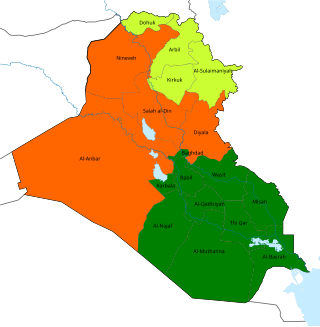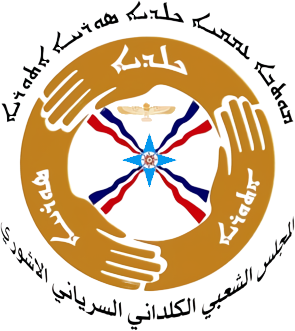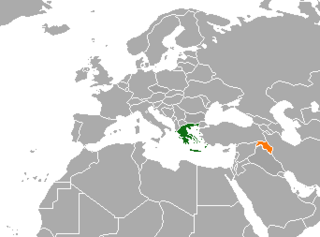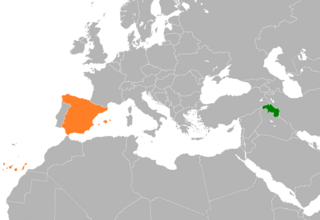See also
- National Government (United Kingdom), sometimes referred to as the National Coalition
The National Coalition is a coalition of opposition groups in the Syrian Civil War that was founded in Doha, Qatar, in November 2012.
National Coalition may also refer to:
Iraq is a federal parliamentary representative democratic republic. It is a multi-party system whereby the executive power is exercised by the Prime Minister of the Council of Ministers as the head of government, the President of Iraq as the head of state, and legislative power is vested in the Council of Representatives.

Jalal Talabani was an Kurdistanî politician who served as the sixth president of Iraq from 2005 to 2014, as well as the president of the Governing Council of Iraq. He was ethnically Kurdish.
The Democratic Patriotic Alliance of Kurdistan (DPAK) sometimes referred to simply as the Kurdistan Alliance (KA) is the name of the electoral coalition first presented as a united Kurdish list in the January 2005 election in Iraq. Elections were held simultaneously for the assembly of Kurdistan Region. The Alliance represents a coalition of the two main Kurdish parties, the Kurdistan Democratic Party and the Patriotic Union of Kurdistan
Kurdistan Islamic Union, colloquially referred to as Yekgirtû, is a Kurdish Islamist party in Iraqi Kurdistan.

Parliamentary elections were held in Iraq on 15 December 2005, following the approval of a new constitution in a referendum on 15 October.

The Kirkuk status referendum was the Kirkuk part of a planned plebiscite to decide whether the disputed territories of Northern Iraq should become part of the Kurdistan Region. The referendum was initially planned for 15 November 2007, but was repeatedly delayed and ultimately never took place.

The Kurdistan Regional Parliament, also known as Kurdistan Parliament - Iraq, or simply Perleman, is the parliament of the Kurdistan Region in Iraq. It is made up of representatives from the various parties, lists or slates that are elected every four years by the inhabitants of Kurdistan Region, which is currently governed by the Kurdistan Regional Government. In 2009 an amendment was applied to the Kurdistan Election Law of the year 1992, changing the name of the body to Kurdish Parliament from its previous name: the Kurdish National Assembly.

Parliamentary elections were held in Iraq on 7 March 2010. The elections decided the 325 members of the Council of Representatives who would elect the prime minister and president. The elections resulted in a partial victory for the Iraqi National Movement, led by former Interim Prime Minister Ayad Allawi, which won 91 seats, making it the largest alliance in the Council. The State of Law Coalition, led by incumbent Prime Minister Nouri Al-Maliki, was the second largest grouping with 89 seats.

Iraq–Israel relations refer to the bilateral ties between the State of Israel and the Republic of Iraq. Due to Iraq's non-recognition of Israel as a legitimate state since the latter's establishment in 1948, the two countries have not had any formal diplomatic relations. The Hashemite Kingdom of Iraq was a part of the Arab coalition that declared war on and invaded Israel shortly after its establishment, sparking the First–Arab Israeli War, and the two states have since then been in a continuous state of hostilities. Iraqi forces also participated in the Third Arab–Israeli War and the Fourth Arab–Israeli War in 1967 and 1973, respectively.

The Chaldean Syriac Assyrian Popular Council, popularly known as Motwa, is a political party in Iraq, that was founded in 2007, on the initiative of Sarkis Aghajan, a high-ranking member of the Kurdistan Democratic Party. As a party that represents minority communities, CSAPC participated in several elections, both on national, regional and local levels, mainly in various coalitions with other minority parties. The current president of the party is Jameel Zaito.

The Kurdistan List, also known as the Kurdistan Alliance or the Brotherhood List, is the name of the electoral coalition that ran in the Kurdistan Regional Government parliamentary elections in Iraqi Kurdistan in July 2009. The Kurdistan List represented a coalition of the two main ruling parties in Iraqi Kurdistan, namely the Kurdistan Democratic Party and the Patriotic Union of Kurdistan. It is the successor of the Democratic Patriotic Alliance of Kurdistan.

The Iraqi–Kurdish conflict consists of a series of wars, rebellions and disputes between the Kurds and the central authority of Iraq starting in the 20th century shortly after the defeat of the Ottoman Empire in World War I. Some put the marking point of the conflict beginning to the attempt by Mahmud Barzanji to establish an independent Kingdom of Kurdistan, while others relate to the conflict as only the post-1961 insurrection by the Barzanis.
In the aftermath of the 2010 election, great attention was given to the decision on who should be the next Iraqi PM. Both al-Iraqiyya's Allawi and the State of Law coalition's al-Maliki laid claim to the post, so it was seen as up to the Kurdish parties and the Iraqi National Alliance to decide this matter.

The Democratic Union Party is a Kurdish left-wing political party established on 20 September 2003 in northern Syria. It is a founding member of the National Coordination Body for Democratic Change. It is the leading political party among Syrian Kurds. The PYD was established as a Syrian branch of the Kurdistan Workers Party (PKK) in 2003, and both organizations are still closely affiliated through the Kurdistan Communities Union (KCK).

Parliamentary elections were held in Iraq on 30 April 2014. The elections decided the 328 members of the Council of Representatives who will in turn elect the Iraqi president and prime minister.

Parliamentary elections took place in Kurdistan Region on 30 September 2018 to elect Parliament. The election came a year after a failed bid for independence and left the ruling Kurdistan Democratic Party (KDP) with 45 seats, that positioning it to lead the next regional government. Announcement of the results was delayed for three weeks. The KDP's historic rival and junior coalition partner in government, the Patriotic Union of Kurdistan (PUK), was in second place with 21 seats. The results suggest that Masoud Barzani’s KDP will take a dominant position in Kurdish politics.

Greece–Kurdistan Region relations are bilateral relations between Greece and Kurdistan Region. Greece has an economic and commercial office in Erbil, while Kurdistan Region has no representation in Greece. In February 2017, Greek Foreign Minister Nikos Kotzias described Kurdistan as having a geostrategic role in the region and constituting an important element in Greek geostrategic policy, and these were the reasons Greece opened a consulate general in Erbil in May 2016.

Parliamentary elections were held in Iraq on 12 May 2018. The elections decided the 329 members of the Council of Representatives, the country's unicameral legislature, who in turn will elect the Iraqi president and prime minister. The Iraqi parliament ordered a manual recount of the results on 6 June 2018. On 10 June 2018, a storage site in Baghdad housing roughly half of the ballots from the May parliamentary election caught fire.

Kurdistan Region–Spain relations are bilateral relations between Kurdistan Region and Spain. Kurdistan Region is represented in Spain through a representation in Madrid since 2010, while Spain has no representation in Kurdistan Region. When the Kurdish representation opened in Madrid, the representative Daban Shadala stated that their activities primarily focused on building confidence, trust and friendship between the two parties. These goals were accomplished according to Shadala and Spanish Foreign Minister Jose Garcia-Margallo held a meeting with Deputy Prime Minister of Kurdistan Emad Ahmad which resulted in the opening of a Spanish honorary consulate in Erbil.